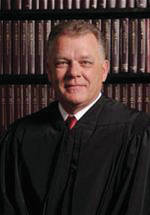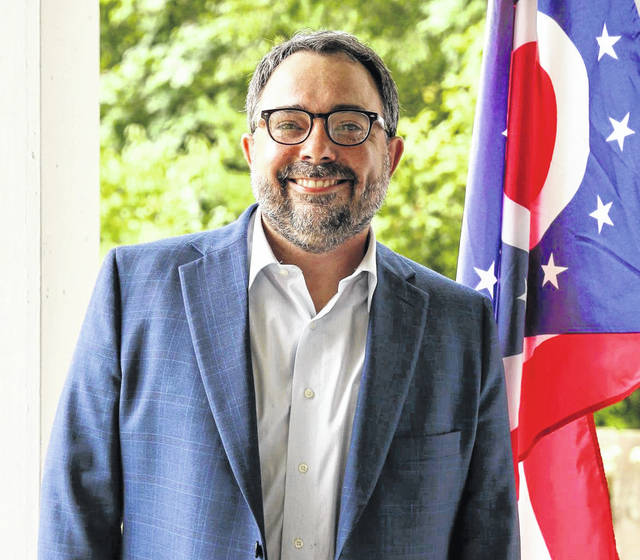

XENIA — Greene County’s probate judge has a challenger in the November election.
While current Judge Thomas O’Diam is running on what he calls an “unmatched” 35 years of experience and expertise, his opponent Mark Babb argues voters should select him instead based on his always-fair and trustworthy approach to the bench.
O’Diam, 61, a Beavercreek High School graduate, said his family has lived in Greene County for nine generations. He and his wife have been married for 41 years and have three children and four grandchildren.
After graduating from the University of Dayton School of Law, O’Diam spent 28 years in the private practice as a certified specialist in estate planning, trust, and probate law, according to a questionnaire sent by this newspaper.
O’Diam became Greene County probate judge in 2013, filling the unexpired term of retired Judge Robert Hagler. O’Diam was elected to a full term in 2014 and is seeking re-election to his second full term. Hagler, along with the Greene County Republican Party and The Miami Valley Trial Lawyers Association, have endorsed O’Diam.
Originally from Akron, Babb, 47, moved to Greene County after completing his studies at the Ohio State College of Law in 1998. He and his wife, Janet, have two children, Violet and Henry. Babb said he also coaches youth sports and is an avid bluegrass musician.
Babb worked at LexisNexis before establishing his law practice in Fairborn in 2005, according to his response. He is currently the managing partner of Babb, Anderson, Rowland, & Smith, LLC, having represented thousands of clients in the county and state.
The lawyer is past president of the Greene County Bar Association, which has endorsed him. He also served on the association’s ethics and judiciary committees.
According to O’Diam, his experience on both sides of the bench matters.
“During my term as probate judge, I have established an exemplary record of honesty, transparency, integrity, innovation, and focus on improving public service,” he said. “I have applied the law equally and fairly to all persons who appear before me, and will continue to do so.”
Babb argued otherwise. If elected, he said, he will never allow immediate family members to practice law in front of him.
“The most important issue is avoiding the appearance of impropriety,” Babb said. “Parties in a court case deserve fairness and justice. When a sitting judge regularly allows his daughter to represent clients in front of him, even with a waiver, it undermines the sense of fairness and fair dealing citizens have a right to expect.”
O’Diam characterized Babb as “a criminal defense attorney with no experience in probate law.”
“As a smokescreen for his lack of experience, my opponent has run a campaign of misinformation, half-truths, and dishonesty, proving he is not fit to serve as a judge,” O’Diam said.
Babb said he’s the right candidate for the job because of the respect and trust he’s gained as a member of the Greene County Bar Association and his experience representing clients. But what really pushed him to run was the “circumstances and events that have unfolded in the Greene County Probate Court,” he said, noting the “problems with the current judge.”
“O’Diam was involved in protracted litigation that ended up in the Supreme Court,” he said. “The Ohio Supreme Court ruled against Judge O’Diam in his attempt to take a courtroom belonging to other judges. This was a tremendous waste of county time and taxpayer resources.”
Babb promised he would be a responsible steward of public funds and the public trust.
“I worked hard to earn the trust, and respect of my clients, my fellow attorneys, and the legal community. If you talk to them, I believe they will tell you I have a reputation as a tough, fair-minded, and honest litigator,” Babb stated on his campaign website. “I have a deep and abiding respect for the law and every individual’s right to the judicial process, and I flat-out love being a lawyer.”
For O’Diam, the most important issue facing the office is continuing to improve the court’s public service with modern technology, ensuring better access to justice through more suitable facilities, and improving outdated laws.
O’Diam said he’s already begun modernizing the court, making many services accessible online during the COVID-19 pandemic. Next year, he will serve on a work group created by the Ohio Supreme Court to explore ways to make courts more efficient through technology.
The court’s hearing room facilities, he said, are unsafe and unsecure. He said he’ll work to find solutions through independent studies.
O’Diam also recently drafted legislation that would streamline name change procedures.
“A judge cannot change the law from the bench,” he said. “So, I am committed to continuing my work with our state legislators to reform laws to be easier, faster, and less expensive.”



